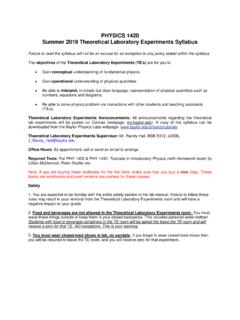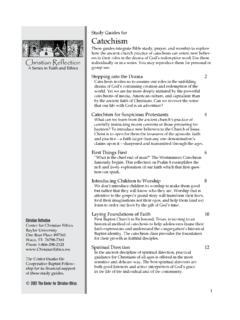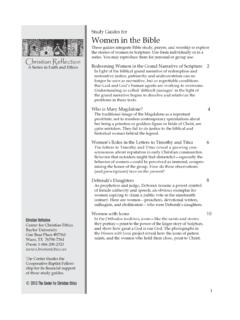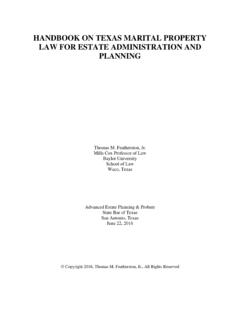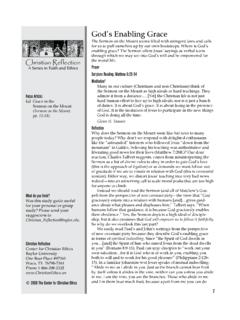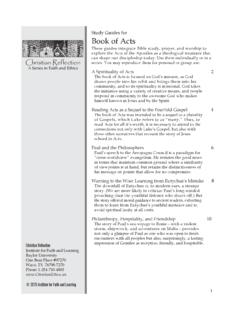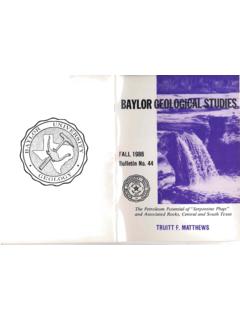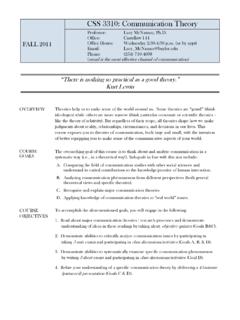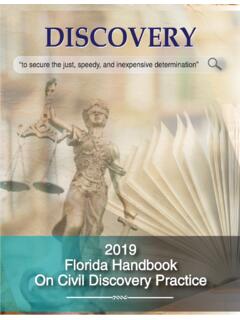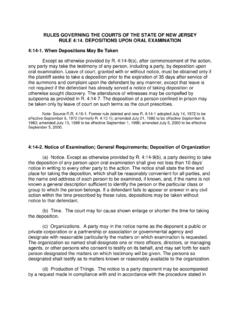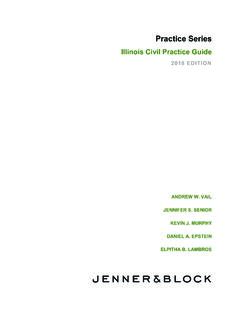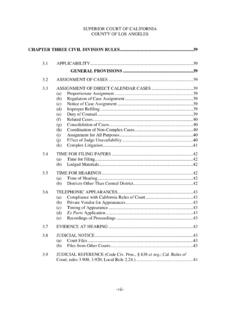Transcription of I. INTRODUCTION - Baylor University
1 (DO NOT DELETE) 6/10/2013 9:36 AM ENDING EVASIVE RESPONSES TO WRITTEN DISCOVERY: A GUIDE FOR PROPERLY RESPONDING (AND OBJECTING) TO INTERROGATORIES AND DOCUMENT REQUESTS UNDER THE TEXAS DISCOVERY RULES by Robert K. Wise* I. INTRODUCTION ..512 II. INTERROGATORIES ..513 A. Interrogatories in General ..513 B. Interrogatory Types ..514 C. Number of Interrogatories ..523 D. Interrogatory Responses ..529 E. Option to Produce Business Records ..533 F. Signature and Verification ..539 III. PRODUCTION A. Production Requests in General ..540 B. Number of Production Requests ..543 C. Responding to Production Requests ..543 D. Production or Inspection ..546 1. Possession, Custody, or Control ..547 2. Usual Course of Business or Organized and Labeled to Correspond with the Categories in the Request.
2 555 a. Documents Are Kept in the Usual Course of Business When the Litigant Functions in the Manner of a Commercial Enterprise or They Result from Regularly Conducted Activity..556 b. The Responding Party Generally Decides the Manner of Production..557 * Mr. Wise is a member of Lillard Wise Szygenda, PLLC, a Dallas, Texas, boutique litigation firm. He thanks his firm s senior associate, Katherine Hendler, and its paralegals, Emily Diebitsch and Lindsay Walton, for their assistance in preparing this article. He also thanks his wife, Kelly, and daughters, Reagan and Riley, without whose support the article could never have been written. The opinions and conclusions in this article are solely those of Mr. Wise and not those of his firm. (DO NOT DELETE) 6/10/2013 9:36 AM 2013] TEXAS DISCOVERY RESPONSE 511 IV.
3 A. Objections in General ..560 B. Proper and Improper Objections to Interrogatories and Production Requests ..567 1. General and Subject-to Objections Are Improper..567 2. Privilege ..572 3. Scope Objections: Relevance and Not Reasonably Calculated to Lead to the Discovery of Admissible Evidence ..573 a. Income-Tax Returns ..576 b. Financial Information and Bank Records ..578 c. Insurance and Indemnity Agreements ..580 d. Settlement Agreements ..581 e. Impeachment Information ..582 f. Discoverable Information Need Not Be Admissible at Trial..583 4. Overbreadth ..584 5. Undue Burden or Unnecessary Expense ..588 6. Vagueness, Ambiguity, or Lack of Specificity ..591 7. Unreasonably Cumulative or Duplicative ..593 8. Expert Opinion ..595 9. Marshalling Evidence ..598 10. Supernumerary 11. The Requested Information or Material Is in the Requesting Party s or a Non-Party s Possession.
4 601 12. Fishing Expedition ..602 13. The Responding Party s Failure to Provide Discovery ..603 14. Harassment ..604 15. Invasion of Protected Rights ..605 16. A Claim s or Defense s Invalidity ..605 17. Confidentiality ..606 18. Compound or Calls for a Legal Conclusion ..607 V. CONCLUSION ..608 (DO NOT DELETE) 6/10/2013 9:36 AM 512 Baylor LAW REVIEW [Vol. 65:2 I. INTRODUCTION Discovery is the largest cost in most civil actions as much as ninety percent in complex It also can be the most frustrating part of litigation because parties frequently fail to respond properly to the two principal types of written discovery: interrogatories and production Rather, many practitioners either intentionally, to withhold damaging information or material, or unintentionally, to protect against claims that a response is inadequate or an objection has been waived, provide evasive responses that are meaningless and leave the opposing party guessing as to whether all responsive information or material has been The failure to respond (and object)]
5 Properly to interrogatories and production requests greatly increases litigation costs by creating a bargaining dynamic in which the original discovery responses are treated merely as a first offer in what will become a protracted series of negotiations in which the original responses are followed by a conference, 1 Court Rules, Amendments to Federal Rules of Civil Procedure, 192 340, 357 (2000) ( [T]he cost of discovery represents approximately 50% of the litigation costs in all cases, and as much as 90% of the litigation costs in the cases where discovery is actively employed. ); see NAVIGANT CONSULTING, The State of Discovery Abuse in Civil Litigation: A Survey of Chief Legal Officers, Chamber Inst. For Legal Reform 8 (Oct.)
6 29, 2008), ( On average, 45-50 percent of respondents civil litigation costs in 2007 related to discovery activities. ); Inst. for the Advancement of the Am. Legal Sys., Preserving Access and Identifying Excess: Areas of Convergence and Consensus in the 2010 Conference Materials 13 (2010), available at ,%20 Preserving%20 Access%20and%20 Identifying% (estimating the percentage of litigation costs attributable to discovery in cases not going to trial was 70 percent). See also Steenbergen v. Ford Motor Co., 814 755, 758 (Tex. App. Dallas 1991, writ denied) ( It is well known that discovery costs are a major part of the overall expense of a trial. ). 2As noted by one federal court: The use of interrogatories and production requests are as much the basics of discovery as blocking and tackling is to football.
7 IMA N. Am., Inc., v. Marlyn Nutraceuticals, Inc., No. CV-06-0344-PHX-LOA, 2007 Dist. LEXIS 61269, at *6 8 (D. Ariz. Aug. 20, 2007). 3 This typically is accomplished in one of two ways. First, by setting forth many boilerplate general objections at the beginning of the response and then incorporating the objections into each response to the extent they apply. Second, by interposing a litany of boilerplate objections to each discovery request and then answering the request subject to and without waiving the objections. See infra Part (DO NOT DELETE) 6/10/2013 9:36 AM 2013] TEXAS DISCOVERY RESPONSE 513 amended responses, further conferences, and more amended responses, and ultimately a motion to This article s purpose is to provide a guide for properly responding (and objecting) to interrogatories and production requests under the Texas discovery The following three sections respectively discuss interrogatories and the rules governing them; production requests and the rules governing them.
8 And objections to interrogatories and production requests generally and the propriety of certain commonly interposed objections to such discovery requests. II. INTERROGATORIES A. Interrogatories in General Texas Rule 197 governs interrogatories written questions propounded by one party to Like other written discovery requests, 4 See Garcia v. Peeples, 734 343, 347 (Tex. 1987) (orig. proceeding) ( Unfortunately, this goal of the discovery process is often frustrated by the adversarial approach to discovery. The rules of the game encourage parties to hinder opponents by forcing them to utilize repetitive and expensive methods to find out the facts. The truth about relevant matters is often kept submerged beneath the surface of glossy denials and formal challenges to requests until an opponent unknowingly utters some magic phrase to cause the facts to rise.)
9 (citation omitted)). 5 The Texas discovery rules are Texas Rules of Civil Procedure 190 215. Hereinafter, individual Texas Rules of Civil Procedure and Federal Rules of Civil Procedure will be referred to respectively as Texas Rule __ and Federal Rule ___. 6 TEX. R. CIV. P. ( A party may serve on another party .. written interrogatories. ). The other Texas discovery rules relating to interrogatories are Rules 190 93, 195, 215. Id. 190 93, 195, 215. Interrogatories cannot be served on nonparties. Id. ( A party may serve on another party .. written interrogatories .. (emphasis added)); cf. Univ. of Tex. v. Vratil, 96 1337, 1340 (10th Cir. 1996) ( Under FED. R. CIV. P. 33(a), interrogatories may only be directed to a party to an action. ); Jackson v. Boise Locomotive, No. H-08-2545, 2009 Dist.
10 LEXIS 64832, at *20 21 ( Tex. July, 28, 2009) ( Under Federal Rule of Civil Procedure 33, courts have uniformly denied litigants attempts to use interrogatories to obtain information from nonparties. (quoting Ackah v. Greenville Cnty. Sch. Dist., No. 6:07-2796-HFF-WMC, 2008 Dist. LEXIS 29227, at *1 2 ( Apr. 9, 2008))). They, however, can be served on parties whose interests are not adverse. Cf. Ferrara v. United States, No. 90 Civ. 0972 (DNE), 1992 Dist. LEXIS 601, at *3 ( Jan. 23, 1992) ( The [Federal] Rule does not limit discovery only to parties that have a hostile stance toward each other in the litigation. ); Andrulonis v. United States, 96 43, 45 ( 1982) ( [N]o degree of adversity between the parties is required .. to serve interrogatories. ). (DO NOT DELETE) 6/10/2013 9:36 AM 514 Baylor LAW REVIEW [Vol.]
